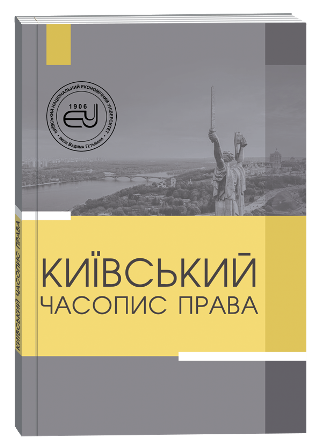SOME ISSUES OF DELIMITATION OF ABUSE OF POWER OR OFFICIAL POSITION AND EXCESS OF POWER OR OFFICIAL AUTHORITY IN JUDICIAL PRACTICE OF UKRAINE
DOI:
https://doi.org/10.32782/klj/2021.3.27Keywords:
abuse, excess, qualification, crime, changes, judicial practice.Abstract
The article analyzes some issues of distinguishing between abuse of power or official positionand abuse of power or official authority. The question of the relationship between Articles 364 and 365 of theCriminal Code of Ukraine, which correspond to the components of these criminal offenses, has always beendebatable and ambiguous in the doctrine of criminal law. However, this relationship has become even morecomplicated due to the adoption on February 21, 2014 of the Law of Ukraine “On Amendments to the Criminaland Criminal Procedure Codes of Ukraine on the implementation of the provisions of Article 19 of theUN Convention against Corruption”.According to this Law of Ukraine, the subject of excess of power or official authority became exclusively a lawenforcement officer. If before the changes the subject was outlined broadly – an official, then in the new versionthe subject composition of this criminal offense is narrowed to a law enforcement officer. However, questions arose as to the content of the acts of “abuse of power or official position”, “excess of poweror official position”. Has their content changed? Has the explanation of the Plenum of the Supreme Court of Ukraineremained relevant? Is the excess of power or official authority committed by an official other than a law enforcementofficer decriminalized? If not, how to qualify such actions?The author tries to answer these questions within the limits of the given publication. The study is based onthe latest trends in the jurisprudence of Ukraine.The author analyzes the decision of the Plenum of the Supreme Court of Ukraine № 15 of December 26, 2003“On court cases practiced in cases of abuse of power or official authority”, as well as legal provisions of the SupremeCourt, formed in separate decisions or official position and excess of power or official authority.An analysis is also made of doctrinal approaches to the distinction between two abuses or positions of positionand abuse of office.
References
Про судову практику у справах про перевищення влади або службових повноважень : ПостановаПленуму Верховного Суду України від 26 грудня 2003 р. № 15. Верховний Суд України. URL: https://zakon.rada.gov.ua/laws/show/v0015700-03#Text.
Мельник П.В. Проблеми кримінальної відповідальності службових осіб. Інтернет-конференція,11–16 березня 2014 р., м. Івано-Франківськ. URL: http://law-dep.pu.if.ua/conference2014/articles/melnyk.pdf.
Хавронюк М.І. Науковий висновок щодо способу застосування Закону України «Про внесення змін доКримінального та Кримінального процесуального кодексів України щодо імплементації до національногозаконодавства положень статті 19 Конвенції ООН проти корупції» від 21 лютого 2014 р. № 746-VII. Україн-ське юридичне товариство : вебсайт. URL: http://justice.org.ua/teoriya-i-praktika/ekspertni-visnovki/naukovij-visnovok-shchodo-zmin-do-kriminalnogo-ta-kriminalnogo-protsesualnogo-kodeksiv-ukrajini.
Постанова Касаційного кримінального суду від 30 вересня 2020 р. у справі № 517/639/17. Єдинийдержавний реєстр судових рішень. URL: https://reyestr.court.gov.ua/Review/92021190.
Анісімов Г.М. Особливості кваліфікації злочинів, що вчиняються шляхом зловживання службо-вим становищем. Вісник Асоціації кримінального права України. 2014. № 2 (3). С. 250–268. URL: http://nauka.nlu.edu.ua/wp-content/uploads/2015/07/3_21.pdf.
Хашев В.Г. Проблемні питання розмежування зловживання владою або службовим становищем таперевищення влади або службових повноважень працівником правоохоронного органу. Науковий вісник Дні-пропетровського державного університету внутрішніх справ. Дніпропетровськ, 2015. № 3. С. 202–209.







